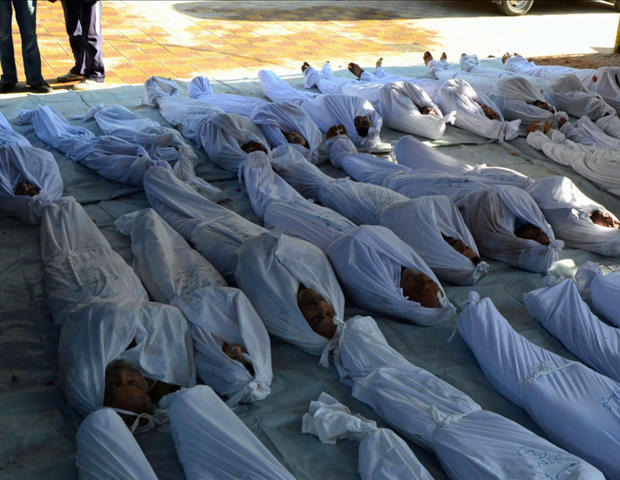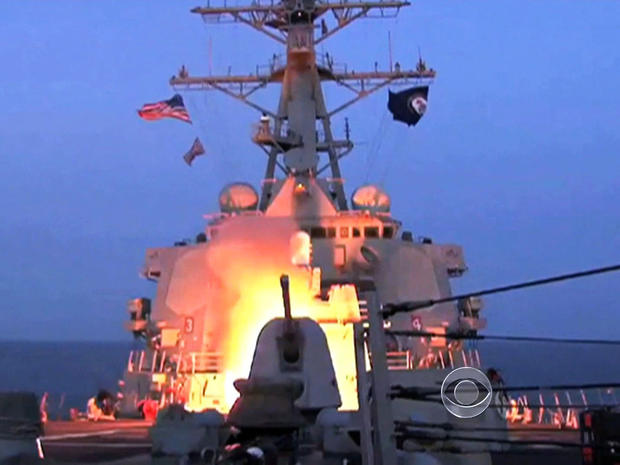U.S. preps for possible cruise missile attack on Syrian gov't forces
(CBS News) WASHINGTON - CBS News has learned that the Pentagon is making the initial preparations for a cruise missile attack on Syrian government forces. We say "initial preparations" because such an attack won't happen until the president gives the green light. And it was clear during an interview on CNN Friday that he is not there yet.
"If the U.S. goes in and attacks another country, without a U.N. mandate and without clear evidence that can be presented," the president told CNN, "then there are questions in terms of whether international law supports it -- 'do we have the coalition to make it work?' Those are considerations that we have to take into account."
The attack on the Damascus suburbs, which left hundreds dead this week, is looking more and more like a poison gas was used. The United States warned Syria months ago that using chemical weapons could provoke a U.S. response.
U.S. detected activity at Syria chemical weapons sites before attack
Hundreds dead in Syria after alleged chemical weapons attack
Syria opposition group claims 1,300 killed in chemical attack in Damascus suburbs
President Obama's national security adviser, Susan Rice, sent out a Tweet on Friday, calling what happened "an apparent CW (chemical weapons) attack." And the commander of U.S. forces in the Mediterranean has ordered Navy warships to move closer to Syria to be ready for a possible cruise missile strike.
Launching cruise missiles from the sea would not risk any American lives. It would be a punitive strike designed not to topple Syrian dictator Bashir Assad but to convince him he cannot get away with using chemical weapons.
Watch a report on Syrian activists gathering evidence to prove chemical attack:
Joint Chiefs Chairman Gen. Martin Dempsey is expected to present options for a strike at a White House meeting on Saturday.
Potential targets include command bunkers and launchers used to fire chemical weapons.
However, officials stress President Obama, who until now has steadfastly resisted calls for military intervention, has not made a decision.
U.S. intelligence detected activity at known Syrian chemical weapons sites in the days before the attack. At the time that did not appear out of the ordinary. But now it is part of the circumstantial evidence pointing toward an attack.
The clearest evidence would come from a team of U.N. experts already in Damascus to investigate earlier, smaller scale incidents involving suspected chemical weapons. So far they have not been allowed into the field. But with pictures providing graphic evidence of mass casualties, even Russia -- long one of the Assad regime's staunchest backers -- is calling for a U.N. investigation.
Whatever an investigation finds, the president will also have to consider what he would do next if he ordered a strike and Syria continued to use chemical weapons.
Watch CBS News correspondent Holly Williams' report on the Syrian victims in the aftermath of the Damascus suburbs attack:
Meanwhile in Syria, two days after the alleged poison gas attack, more disturbing video has emerged of the aftermath. From it comes horrific scenes that show the dead and the dying -- many of them children.
One young boy described struggling to breathe and then losing consciousness. When he woke up in the hospital, he said, he could no longer see.
It's impossible to verify how many people died. But in a crowded, makeshift morgue, so many of the bodies were unidentified -- they were numbered.
Dr. Ghazwan Bwidany is caring for survivors of the attack at a clinic in Damascus. On Friday, CBS News spoke with him over the Internet. He said his mobile medical unit treated 900 people -- 70 of whom died.
"When you see these children," said Bwidany, "dying in front of our eyes, this is a very terrible feeling. I can't describe it."
Watch this video below of a Syrian mother saying goodbye to her children who were killed after reported gas attack:
Dr. Bwidany said some of the survivors have neurological problems, such as memory loss and confusion, that he believes could only be caused by a nerve agent.
So if this wasn't a chemical attack, what could it have been? "I don't know anything else that could make these symptoms, with this large number of injured," he said.
CBS News talked with a spokesman for the Syrian opposition Friday, who said he was angry and frustrated with the international community. He believes that if U.S. had delivered the arms it promised the opposition two months ago, the deadly attack may not have happened.



